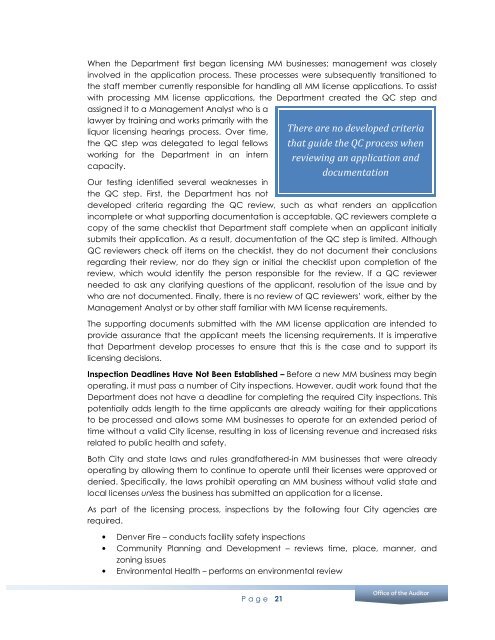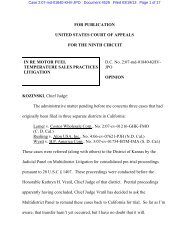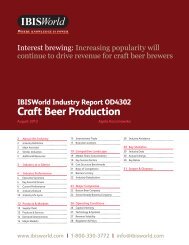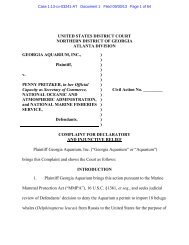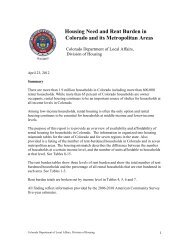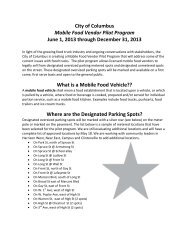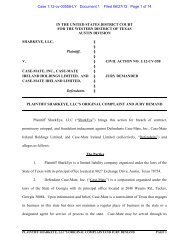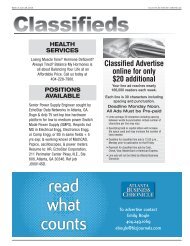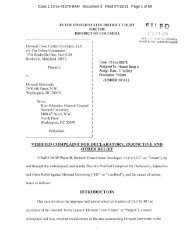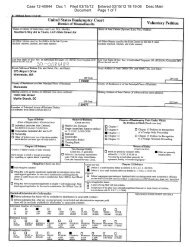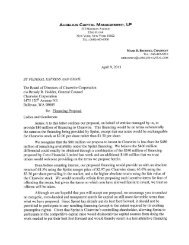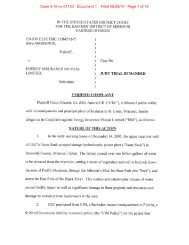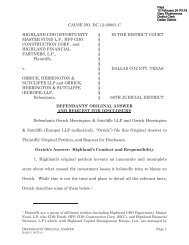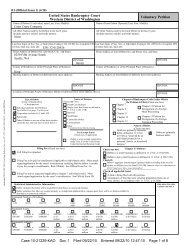Audit - City and County of Denver
Audit - City and County of Denver
Audit - City and County of Denver
You also want an ePaper? Increase the reach of your titles
YUMPU automatically turns print PDFs into web optimized ePapers that Google loves.
When the Department first began licensing MM businesses; management was closelyinvolved in the application process. These processes were subsequently transitioned tothe staff member currently responsible for h<strong>and</strong>ling all MM license applications. To assistwith processing MM license applications, the Department created the QC step <strong>and</strong>assigned it to a Management Analyst who is alawyer by training <strong>and</strong> works primarily with theliquor licensing hearings process. Over time,the QC step was delegated to legal fellowsworking for the Department in an interncapacity.There are no developed criteriathat guide the QC process whenreviewing an application <strong>and</strong>documentationOur testing identified several weaknesses inthe QC step. First, the Department has notdeveloped criteria regarding the QC review, such as what renders an applicationincomplete or what supporting documentation is acceptable. QC reviewers complete acopy <strong>of</strong> the same checklist that Department staff complete when an applicant initiallysubmits their application. As a result, documentation <strong>of</strong> the QC step is limited. AlthoughQC reviewers check <strong>of</strong>f items on the checklist, they do not document their conclusionsregarding their review, nor do they sign or initial the checklist upon completion <strong>of</strong> thereview, which would identify the person responsible for the review. If a QC reviewerneeded to ask any clarifying questions <strong>of</strong> the applicant, resolution <strong>of</strong> the issue <strong>and</strong> bywho are not documented. Finally, there is no review <strong>of</strong> QC reviewers’ work, either by theManagement Analyst or by other staff familiar with MM license requirements.The supporting documents submitted with the MM license application are intended toprovide assurance that the applicant meets the licensing requirements. It is imperativethat Department develop processes to ensure that this is the case <strong>and</strong> to support itslicensing decisions.Inspection Deadlines Have Not Been Established – Before a new MM business may beginoperating, it must pass a number <strong>of</strong> <strong>City</strong> inspections. However, audit work found that theDepartment does not have a deadline for completing the required <strong>City</strong> inspections. Thispotentially adds length to the time applicants are already waiting for their applicationsto be processed <strong>and</strong> allows some MM businesses to operate for an extended period <strong>of</strong>time without a valid <strong>City</strong> license, resulting in loss <strong>of</strong> licensing revenue <strong>and</strong> increased risksrelated to public health <strong>and</strong> safety.Both <strong>City</strong> <strong>and</strong> state laws <strong>and</strong> rules gr<strong>and</strong>fathered-in MM businesses that were alreadyoperating by allowing them to continue to operate until their licenses were approved ordenied. Specifically, the laws prohibit operating an MM business without valid state <strong>and</strong>local licenses unless the business has submitted an application for a license.As part <strong>of</strong> the licensing process, inspections by the following four <strong>City</strong> agencies arerequired.• <strong>Denver</strong> Fire – conducts facility safety inspections• Community Planning <strong>and</strong> Development – reviews time, place, manner, <strong>and</strong>zoning issues• Environmental Health – performs an environmental reviewP a g e 21Office <strong>of</strong> the <strong>Audit</strong>or


